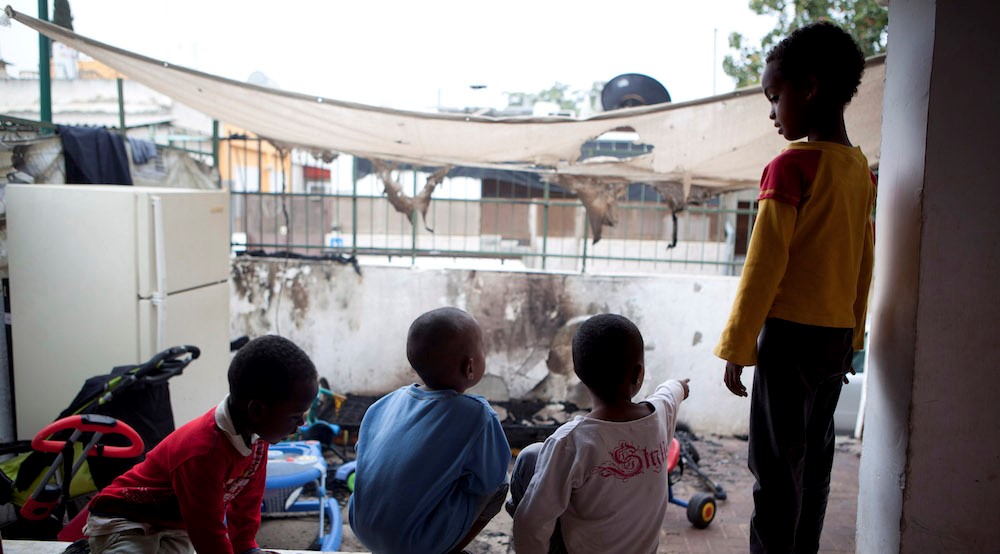Attorneys Tal Hassin of the Association for Civil Rights in Israel (ACRI) and Haran Riechman of the Clinic for Law and Educational Policy within the Law Department of the University of Haifa have petitioned the Tel Aviv Administrative Court on behalf of 325 children of asylum seekers, against the Tel Aviv Municipality and Ministry of Education demanding the development of an integrated education policy in the city. The groups backing the petition include ASSAF (Aid Organization for Refugees and Asylum Seekers in Israel), ACRI, The Levinsky Garden Library, Hadash members of the Tel Aviv Municipal Council and nearly 100 Israeli-born children who are residents of Tel Aviv.

Children of African migrants in Tel Aviv view the aftermath of a Molotov cocktail attack on their segregated kindergarten in the Shapira neighborhood of south Tel Aviv, April 27, 2012. (Photo: Activestills)
In the early 1950s, African-American and white anti-racists protesters took to the streets to protest the policy of segregation between Black and White students in the United States education system. Almost seventy years later, in the city of Tel Aviv-Yafo there are separate schools and kindergartens for children of asylum seekers, the vast majority of whom are from African countries. In the submitted petition the Court is asked to re-anchor the principles of the aforementioned precedent-setting judgment: the very separation in education is discriminatory; separate is not equal even if the different groups receive similar budgeting and resources.
The petition alleges that the Tel Aviv-Yafo municipality has four elementary schools and about 60 kindergartens in which children of asylum seekers are educated separately from the general population. The severe damages caused to the children of asylum seekers due to their placement in segregated educational institutions include, among other things, severe humiliation and social labeling, educational and cognitive damages, and harmful damage to their healthy development. This policy ignores the circumstances of the lives of the asylum seekers’ children and their present situation, and even encourages intolerance and racism towards this population, an already vulnerable population in Israel today.
The petition is supported by numerous opinions from experts in education and pedagogy, cognitive psychology, child neurology and child development that indicate the urgent need to integrate children of the foreign population in schools alongside children who are citizens of Israel. The tremendous benefits inherent in this move are not limited to the children of asylum seekers. Opinions and research in the field further show that an informed integration policy contributes to the entire student population, and further dismantles racist stereotypes and patterns in society as a whole. The integration of asylum seekers’ children in integrative schools may even save a significant amount of money for the public, as such children are often eventually sent to special education frameworks, even though the vast majority of their development potential is perfectly normal.
Dafna Lev, former director of the Education Administration, emphasizes in the petition, the great benefits of integration on behalf of the children who are citizens of Israel, who have absorbed asylum seekers into their classes: “Not only the children of asylum seekers are benefiting from integration. The integration program also provided significant benefits to Israeli children. The encounter of these students with a different population, who have different life experiences and a different culture, opened up for them an opportunity to get to know a vulnerable population whose lives are completely different from anything they have known. This has led to a lot of feelings of solidarity, recognition of the other and an understanding that the world is more complex than they know when they grow up in a homogeneous society.”
According to attorneys Riechman and Hassin, “The collection of affidavits and the conversations with the petitioners seeking asylum again raised the humiliation involved in this policy of segregation, the humiliation that children feel already in kindergarten. We hope that the authorities will correct the situation soon, and if not, the court will instruct them to act in a way that respects a democratic society.”


